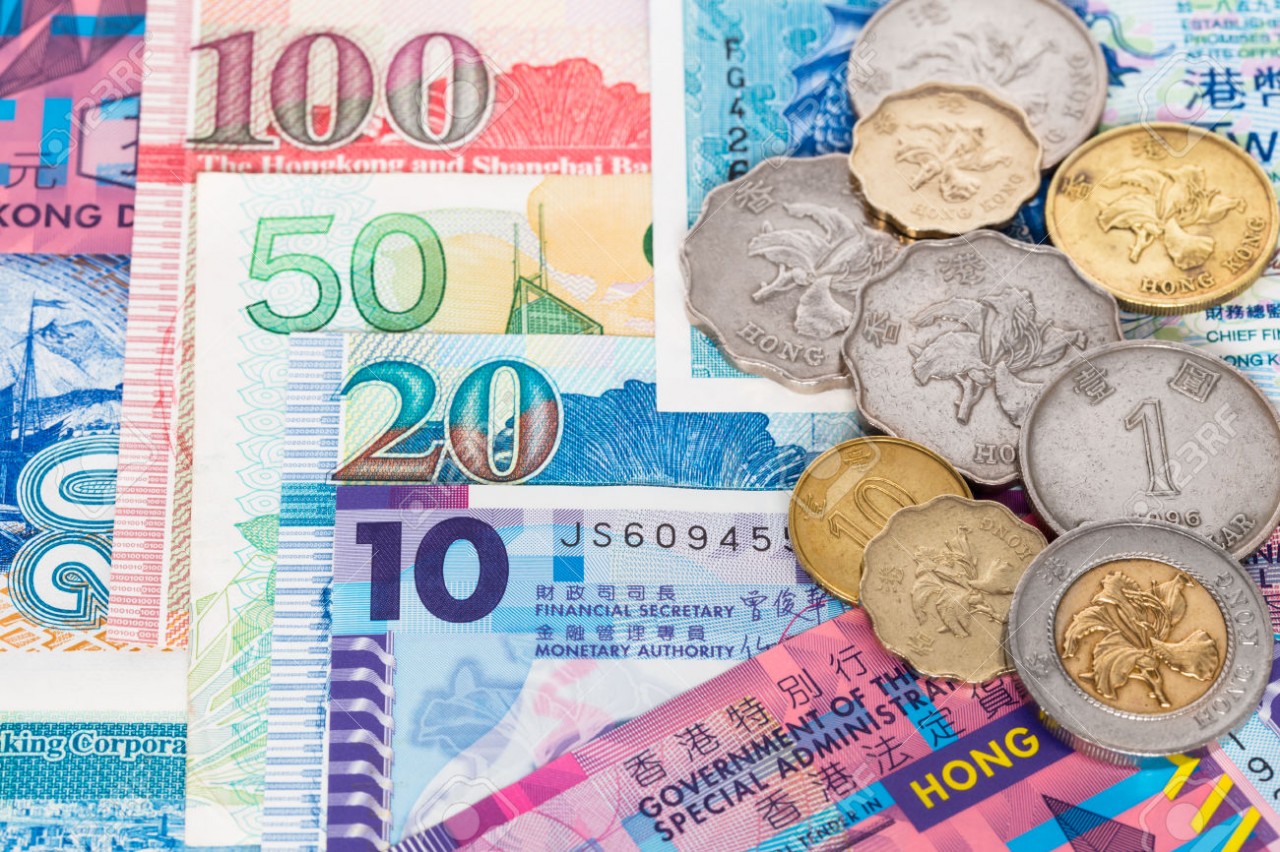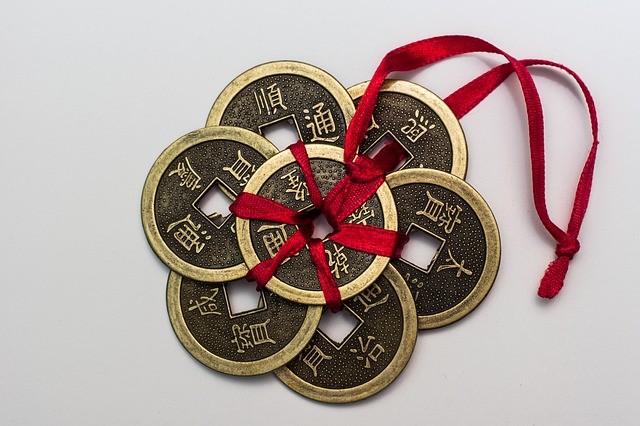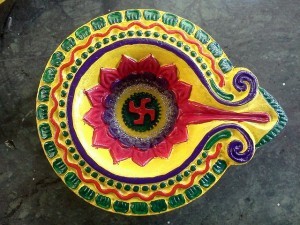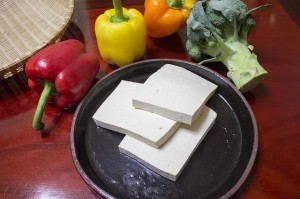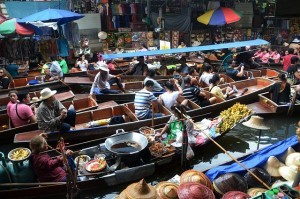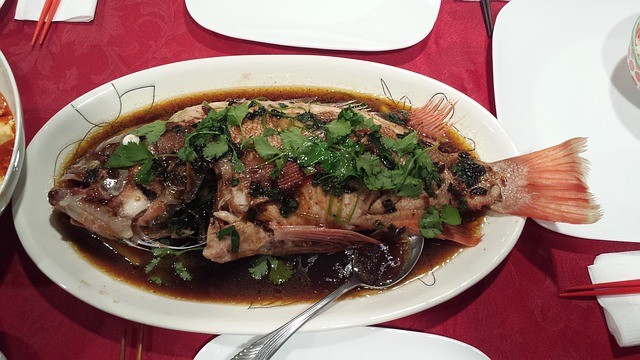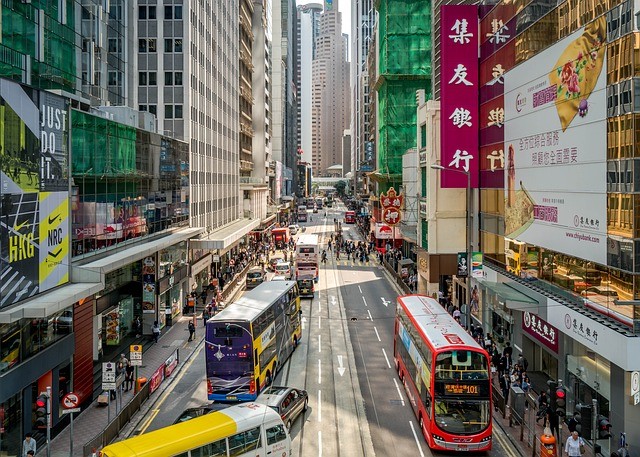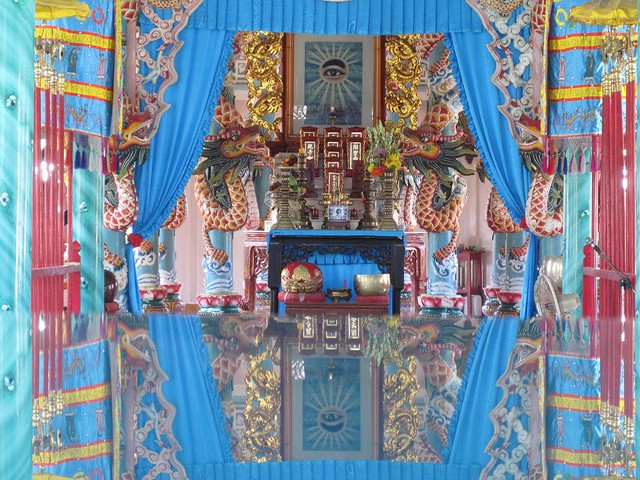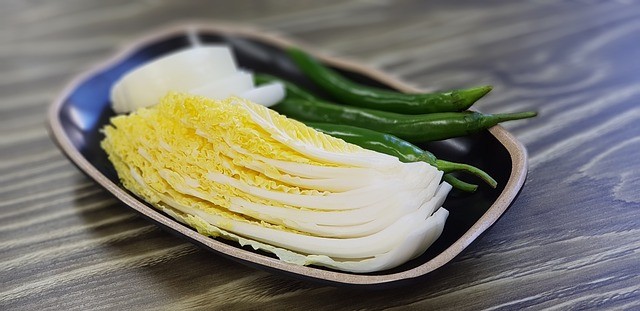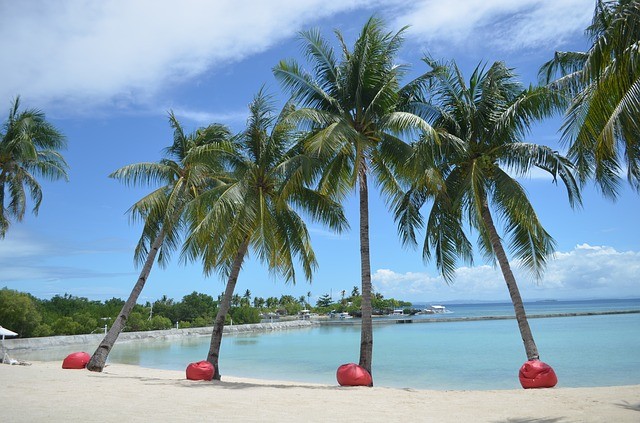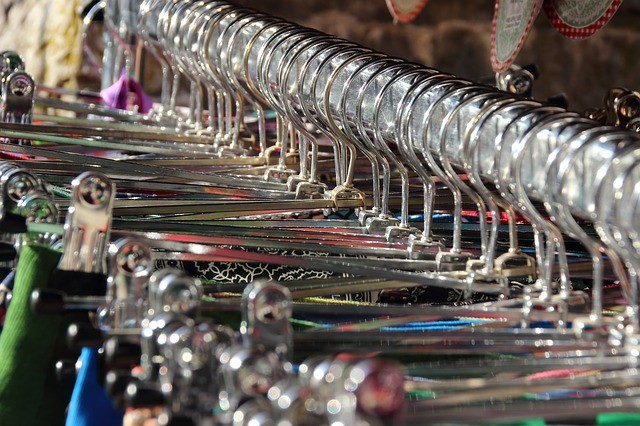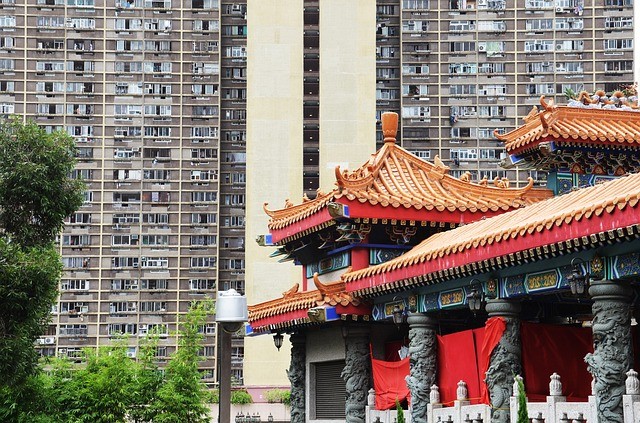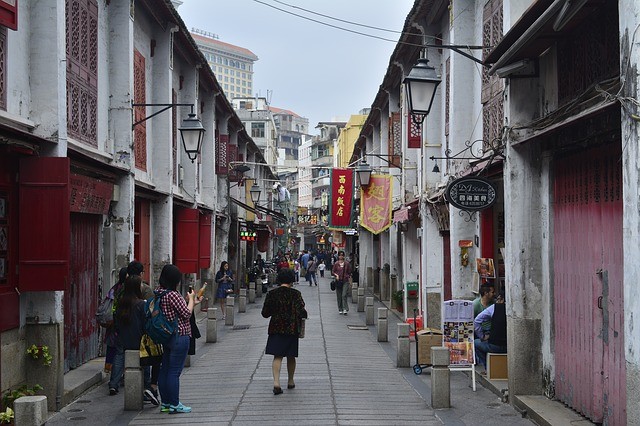Quick question: What do you think of when Hong Kong is mentioned? Good food, people drinking in bars and yelling in Cantonese on the streets, and perhaps even adrenaline-fuelled police chases, courtesy of Hong Kong crime dramas (we’re looking at you, Infernal Affairs). You would be right, but there’s also more to the Fragrant Harbour than those! Without further ado, let’s take a look at the top 10 things that makes Hong Kong, well, Hong Kong!
1. Hong Kong’s public transportation is one of the world's safest, most efficient and frequent
There are a few ways of getting around Hong Kong, all of which are safe and trustworthy. When you arrive at Hong Kong International Airport (HKIA), you can either take the Airport Express into the city, the MTR, or hail a taxi. When you arrive downtown, you can either take the bus, ferry, tram, and train/subway. Keep in mind though that transportation on buses and trams requires the exact fare, so it’s highly recommended that you purchase on Octopus card—a smart card that allows you to store value for making electronic payments in online or offline systems in Hong Kong.2. Hong Kong International Airport is also known as Chek Lap Kok Airport
To distinguish it from its predecessor, the closed Kai Tak Airport, locals have taken to calling the main airport Chek Lap Kok Airport. Did you know that HKIA is one of the biggest contributors to Hong Kong’s economy? The airport boasts the world’s busiest cargo gateway and one of the world's busiest passenger airports.3. The exchange rate of the Hong Kong dollar (HKD) to the US dollar is about 7.75 HKD to 1 USD*
In Hong Kong, banknotes come in denominations of $10, $20, $50, $100, $500, and $1,000, while coins are available in denominations of 10 cents, 20c, 50c, $1, $2, $5, and $10. Interestingly enough, the Government issues coins while Hong Kong banknotes are issued by 3 commercial banks: HSBC, Standard Chartered Bank and Bank of China.*At the time of writing 10/06/2020
4. The official languages of Hong Kong are Chinese and English
For a long time (from 1883 to 1974, to be exact), English was the sole official language of Hong Kong until the Chinese people (quite rightly) demanded equal status for their native language. The variation of Chinese that locals speak is Cantonese, although the older generations and the few living in the rural areas speak Hakka. According to expats who have lived in Hong Kong for a long time, you don’t need to learn Cantonese to survive in the country as English is everywhere, but you’ll definitely be missing out on a lot of the local culture!5. Hong Kong has a vibrant and bustling nightlife
Hailed as the “sleepless city”, Hong Kong comes even more alive at night. The nightlife scene provides plenty of options for night owls, such as cultural performances, clubbing, night markets, and midnight runs—basically, everything opens late! If this is your first time in Hong Kong, Lan Kwai Fong and SoHo are good places to start, as they are packed full of bars and nightclubs. Fancy something more spectacular? Don’t miss the Symphony of Lights show every night at 8pm at Victoria Harbour—it’s an interactive light show that combines the lights of 45 key surrounding buildings with music. According to the Guinness World Records, it’s the world's largest permanent light and sound show.6. Known as a place where “East meets West”, Hong Kong’s culture is uniquely diverse
Hong Kong city may be as modern as it comes, but its still steeped in tradition and culture. Most of the locals also have their roots in Mainland China, as well as from its time as a British colony, and you can find evidence of their cultural influence in the country’s language, food, and festivals. Take a walk down the streets of Hong Kong and you’ll find various places of worship, shops decorated with good luck charms; and locals burning offerings and joss sticks by the side of the road. Immerse your taste buds in local dishes like Dim Sum, Chiu Chow congee—a porridge-style dish that’s enriched with meaty baby oysters or the popular Hakka dessert deep-fried fresh milk, a famous Hakka dish that’s formed of a sweet dough wrapped in crispy skin, and many more.7. That said, the char chaan teng culture is a unique, not-to-be-missed experience when you’re in Hong Kong
A char chaan teng is an important part of Hong Kong culture, established as a cheaper alternative to Western-style cafes. It literally translates to ‘tea restaurant’, and is known for its affordable prices and Hong Kong-style Western cuisine, such as Hong Kong-style milk tea, Yuanyang—a mixture of coffee and tea, macaroni in soup, Hong Kong-style French toast, sandwiches consisting of either egg, luncheon meat, corned beef or a mixture, and egg tarts. Fun fact: In April 2007, a Hong Kong officer suggested that cha chaan teng be listed in the UNESCO Intangible Cultural Heritage Lists because of its significant role in Hong Kong society!
8. Shopping malls in Hong Kong are built to cater to all tastes, and Causeway Bay is Hong Kong’s shopping mecca
With its reputation as an entertainment hub, Hong Kong is no stranger to branded items and the latest fashion trends. Causeway Bay is the embodiment of the country’s shopping scene, with options ranging from top-end designer boutiques to mid-price luxury goods to affordable fast moving fashion brands. Bear in mind that fashion is not the only thing to be found at Causeway Bay, you can also find shops specialising in beauty and skin care, electronics, computers, snacks, interior decor, and much more.9. Hong Kong has its very own theme park, Ocean Park Hong Kong, which is better than Hong Kong Disneyland
Yes, you read that right. Hong Kong may have its very own version of Disneyland, but it pales in comparison with the island’s own original theme park, Ocean Park Hong Kong—not to mention that if you’ve been to Disney World or Tokyo Disneyland/DisneySea, you’ll find Hong Kong to be fairly small. Not only is Ocean Parkthe world’s 13th most visited theme park, it’s also the largest theme park in Asia! The theme park consists of an amusement park, a marine mammal park, an oceanarium, and an animal theme park, and more than enough attractions and rides to guarantee multiple visits!10. The weather in Hong Kong can get humid
Hong Kong is one of the few Asian countries with 4 seasons and sub-tropical climate which mean frequent rain in spring (March to May), hot, humid summers (May to September), Cooler month of autumn (end of September to November) and cold winters (December to February). Spring tends to bring fog and drizzles, so be prepared with a light overcoat and sweaters, as well as raincoats. According to fellow expats, summers can get extremely hot and humid, so come prepared with lightweight and loose-fitting clothing and plenty of water. Autumn is arguably the best time in the country, as it is cool and dry—perfect for a stroll along Victoria Bay or excursions to Lamma Island or Lantau Island. Last but not least, winters in Hong Kong are dry and cool, though you will not see snow—if you’re used to freezing temperatures in the US or UK, you’ll find winters in Hong Kong bearable.Do you have any advice for first timers visiting Hong Kong? We would love you to share your experiences in the comments below!
Hong Kong does not necessarily have to be all city slickers and high-end living. It is in fact a great city to explore with your children. Here is The Expat's rapid-fire guide of some of the best things to do in the great outdoors with the family.
Hong Kong Disneyland Resort.
Disneyland is probably pretty high up on most children's bucket list of 'things to do before I'm 14'! And a trip to the Hong Kong resort will not disappoint. The park has hotels set within the grounds of the vast complex for the ultimate experience (and expense), or tickets are available to visit as a day guest. The resort is divided up into seven zones that offer different themes and experiences. We have put together a comprehensive guide to visiting Disneyland, you can read more about the park here
You might have missed this piece of news but now you can submit an e-report if you wish to inform the police of a crime. Visit the e-Report Room here or if you are in an emergency, do not hesitate to dial 999.
Yes, the number to call Hong Kong Police in an emergency is 999
What to do if you are burgled or experience a robbery
You should report the crime immediately, either by calling 999, notifying a police officer, visiting the police station or by phoning your nearest station. If you are on the premises, then check to see if the burglars are still in the building. If so, do not approach and call 999. You should also alert building security immediately. Once you are in your home, you should resist the urge to touch or move anything as this could tamper with evidence. Also, try not to find out what you are missing until the police arrive. Uniformed officers will arrive first and will be followed by detectives, and it is vital that you relate to them as much information as you can possibly remember in the lead-up to the crime. Forensics experts may arrive to take DNA swabs from anyone living the house as well as to take photographs, so do not be alarmed if you are suddenly inundated with strangers. Police may or may not require you to make a written statement depending on how serious the crime is. You may have to be interviewed numerous time by police during the investigation and Crime Prevention Officers may pay you a visit to offer advice how best to protect your home. Your missing property will be listed on the police database. Once an arrest is made, you will be expected to make an identification in a parade and to later identify your stolen property. The same process will also apply if you are the victim of a robbery, with the exception of calling an ambulance if you or another person need immediate medical attention.
What to do if you experience sexual violence
You should report the crime immediately after it has occurred, by dialling 999 or going to the nearest police station. Do not throw away any clothing or try to clean your clothes before being interviewed by police. It is essential to preserve as much evidence as possible. Try to remember as much information as you possibly can, especially details regarding the appearance of the assailant. Forensic investigators may take photos of the scene and of your injuries, if you have any, so be prepared for this, no matter how intrusive it may seem. Your belongings may be taken and you may have to submit your fingerprints. You will be asked to give a formal statement but you will be interviewed by an officer with the same gender as you. You may be asked to help with a composite sketch of the perpetrator or you may be asked to look at photographs of suspects. If any arrests are made, you will have to attend an ID parade, which will usually be held in a one-way viewing room. You may have to attend court, but this can be done by a live video recording, behind a screen or in open court. Officers will maintain contact with you throughout, in order to keep you notified of the progression of the case. You can find further information here at CEASE Crisis Centre or at the Victim’s Charter. Remember, that the e-Report Room is only for non-urgent crime. If you find yourself in an emergency, call 999 right away.
Have you ever experienced or witnessed a crime in Hong Kong? Comment below with your stories (anonymously if you prefer).
Thanks to the huge Indian population in Singapore, there are numerous ways that you can celebrate the Festival of Light in the city. So if you want to celebrate this Indian tradition (it falls on 14th November this year), head on down to Little India and take part in some of the fun.
Enjoy the lights
Simply taking a walk along the streets of Little India is enough to see some beautiful displays of lights. The real focal point are the peacocks at the beginning of Serangoon Road, and if you want to see the lights at their best, hang around until 7pm when the sun goes down and the whole street becomes electrified. The lights will be on until midnight and will last for a little longer than the five days of the festival of light.
Enjoy some authentic Indian food
The Song Of India is offering a special menu for Diwali and you will be able to see why they have earned a Michelin star. The tasting menu has four courses, including an ‘art palette’ that has seven different tastings. If that is out of your budget, then head to any of the Indian restaurants that dot the streets in Little India for some deliciously authentic food.
Eat sweets until you feel sick
Indian sweets are addictive, sticky and sugary and once you start, you won’t be able to stop. Head over to Punjab Grill at Marina Bay Sands to buy their special Diwali sweet boxes. Look out for mango with white chocolate as well as green tea and pistachio. They also have plenty of dates and figs to celebrate without going into a sugar coma.
Hong Kong has more than it’s fair share of weird food items, found in food stalls, restaurants or even in your local supermarket. Not sure what to try first? Here is our definitive list of the best!
Bird Nest Soup
This is one of the most expensive delicacies you can find on the island and also, one of the strangest. Made from the solidified saliva of the male Swiflet bird, the soup (apparently) has a high nutritional value, as well as being extremely well sought after for it’s exclusivity. It can be prepared as a sweet or savoury dish, and will normally be served alone, so as not to ruin the flavour. The whitest nests are the purest and most expensive, and once cooked, will become gelatinous. They can be bought in specialty shops for around HKD $150-500 per gram. You can also try it here at: Tin Ngai Kam Bird Nest Place, 210 Shanghai Street, Yau Ma Tei, $238 for a small portion. Shang Palace, inside the Shangri-La Hotel, $680-720 per person.
Stinky tofu
If normal tofu doesn’t float your boat, then why not try stinky tofu? This is an extremely popular street food and can be found almost anywhere. Originating from mainland China but making it’s mark in Hong Kong and in Taiwan, stinky tofu is made from a fermented brine which itself comes from fermented vegetables, meat, and seafood. The tofu is then immersed in this brine and is then deep fried and served with hoisin sauce. It does not smell great and you might regret it, but make sure you try this street food snack at least once.
Century egg
Often topping lists of ‘most disgusting food in the world’, the century egg is not for the faint-hearted. Century eggs are also known as ‘one hundred year egg’ or ‘thousand year egg’ and is usually a duck, chicken or quail egg that has been preserved in a mixture of clay, ash, quicklime and ricehulls. If you don’t know the ingredients, all you need to know is that when they are mixed, it smells rather like urine. The eggs are usually served in congee, or with garlic, chili and vinegar. You can even find century eggs in local supermarkets, tinned or served in an egg box. If you need more encouragement, century eggs are supposed to be the best hangover cure.
It might seem strange to haggle for people from western cultures, but having some haggle skills is essential for shopping in many places around Asia. The fun part is that you can negotiate for almost anything, including hotel rooms, clothes to taxi rides. You might feel uncomfortable at first, but once you master the art, it will be a skill to serve you for life. Here are some tips for haggling effectively.
Shop around first
By getting an idea of some of the prices on offer, you will be better informed about what to offer. It will also give you a bargaining tool if you know a nearby shop is offering the same item for less. Try to avoid buying what you want in the first shop you go to, as you will probably find what you are looking for in several others. In the same breath, avoid buying at the more tourist facing markets and malls as sellers have an eye for a profitable opportunity! Many of these places have had their prices inflated for tourist traffic and as so many tourists have just paid the first price they were offered, haggling in these environments has becomes defunct.
Arrive early
Sellers and market traders are more likely to offer good prices if you are the first sale of the morning. This is considered to be the lucky sale and it is more probable that you will get your goods for less. The same goes for night markets, so try to arrive as the trader is setting up for the night.
Be friendly
Try not to confuse teasing with offense, and act shocked when the vendor tells you the first price. Be open and view it as a friendly interaction. The more you joke around but hold firm on your price, the more likely it is that the vendor will warm to you and offer the price that you are asking for.
Act disinterested
Even if the item is something that you really want, try to act like you could live without it. Pointing out flaws and marks is also part of the game and will not offend the vendor. They fully understand that you can find the same item elsewhere so they will try to close the sale as quickly as possible.
We looked at some useful tips for avoiding common mistakes you may inadvertedly make in Hong Kong, but what happens if you are invited to a business lunch? This could be for networking, as a client, for investment, or for a job application. Whatever the reasons, dining out in Hong Kong can be a social battlefield, so let us guide you through some useful etiquette to impress your fellow dinner table guests.
Be prepared to spend a lot of time eating
Business lunches or dinners in Hong Kong can be quite lengthy. Some lunches can be between ten and twelve courses, which is usually displayed on a revolving disc in the centre of the table. The host will serve you the food, so do not try to serve yourself as you may risk offending your host.
Don’t eat before your host
Whilst you must wait for your host to serve you, you should also wait for them to begin eating before you start to tuck in. Try not to eat too quickly, as this can be seen a sign of an unwillingness to enjoy the food and a desire for it to be over with as quickly as possible. Take your time and really enjoy each course.
Do not move the fish
This might sound strange but fish is served with the head facing the host or guest of honour. The head is a delicacy, so in this case, try to avoid moving the fish unless explicitly told to do so. Keep it the way it was facing when it was served and do not begin to debone or cut the fish, as this will be done by the host or the server.
Be prepared for new types of food
There will most probably be dishes on the table that you have never seen before. This could be abalone (a real delicacy), duck feet, snake soup, shark fin soup, or thousand year egg. You might not find it particularly appetising but try not to show this to your host as a mark of respect.
Travelling to far-flung destinations can be exciting or daunting, depending on your frame of mind. But one thing is for sure, taking a little time to plan can make all the difference once the novelty wears off and the boredom sets in...
First of all, what a long-haul flight is requires some definition; technically, it is any flight that is over four hours, however, just to add to matters, it then falls into two different categories; medium long haul and ultra-long haul, the latter being a flight over eight hours. For example, a flight from London to Hong Kong totals around twelve hours making it ultra-long-haul. But it is not just the length of the actual flight that needs to be planned for, there is the journey to the airport, check in, security, boarding, immigration checks at your destination, reclaiming baggage and then your transfer to your final destination all adding hours to your total door to door time. We’ve put together some of our best tips to help you survive your long-haul trip!
Be kind to yourself. Reducing your stress levels the day before your trip can make a huge difference to your experience on the big day. Make sure you plan ahead and get everything ready in plenty of time to avoid those last-minute panics that stress everybody out; make sure you have located and checked all your documents in good time, why not treat yourself to a nice folder to keep your tickets, passports, visa information, insurance, emergency contact numbers, your travel itinerary and other relevant articles in. Then the day before you travel you will be able to do pleasant activities that relax you; don’t pull a 12-hour shift and leave your packing until the small hours of the morning.
Hand luggage and essentials ‘flight pack’.
Well thought out hand luggage can be a real gamechanger on a long-haul flight. Having the right items within easy reach can reduce stress and add to your comfort. Make sure you pack some extra layers of clothes to wear; cabin climate control can sometimes be on the chilly side and having spare clothes, or at least fresh underwear, to change into when you arrive will help you feel less dishevelled. Packing a little bag with essentials such as, comfort eye drops, toothbrush and toothpaste, tissues, flight stockings, painkillers, ear plugs, an eye mask, a small mirror, some make up, small pack of ‘freshen up’ wipes, hand cream, and antibacterial hand gel can go a long way to make your journey more comfortable, just pop it on top and everything will be within easy reach. Don’t forget to pack headphones, your phone, iPad or android tablet, (even in ‘flight mode’ these can help while away the hours). Don’t forget to install apps such as FlightAware which gives you updates on airport delays and flight delays, it can be set to send you notifications, weather updates, and maps your journey so you can see the route you will be taking. Being able to reduce boredom, stress, and anxiety is really useful, try using apps that use meditation techniques such as Calm, The Mindfulness App, Headspace, and Omvana are particularly useful when you're trying to sleep but find yourself distracted by noise, other people, or just the general goings on, alternatively, listen to music on Spotify, Google Play Music, or Apple Music apps to dull the drone of the plane engines. Downloading the kindle app on your phone or tablet means you can have a wide choice of reading material without adding bulk, or weight, to your hand luggage. Always download a few movies that you love because sometimes you just want to be brain dead and not have to follow a plot that requires any concentration, the movies may not be to your taste, and airplane screens can dry your eyes (hence the comfort eye drops in your essentials pack).
If you are being relocated to Hong Kong there are some factors to be aware of; how can you ensure that your transition is as smooth as possible? What are some of the challenges you may have to face? How can you overcome them?
Learn some Cantonese
Whilst learning another language may sound like a nice hobby, it may be essential in Hong Kong. Most people in multi-national firms will speak excellent English, but knowing some phrases in Cantonese will certainly set you apart from others. You may find that you have to deal with non-English speakers so knowing how to manage the language will prove invaluable.
Balance your life
Many people in Hong Kong work extremely long hours, and will even come into the office on weekends. Be prepared to work an extremely demanding schedule, but make sure that you have some downtime. Joining a club or a gym will be a well-deserved respite from the demands of the office.
Take time out to eat
Try not to eat lunch at your desk. In Hong Kong, eating out with your colleagues (or alone) is extremely important. Lunch is also the perfect opportunity to network and get to know your colleagues better. If you are a manager, taking your team to lunch occasionally is paramount to building a bond and will be greatly appreciated.
Be more hands-on
If you take a managerial position, then be prepared to be more hands-on with your staff. This may mean being more prescriptive than you are used to back home. It may seem unfamiliar at first and you may feel that you are telling your staff what to do, rather than supervising their work, but it is part of the work culture here.
Be realistic about renting
You may find that your living space has suddenly reduced significantly in size. So bear in mind that whilst there are plenty of shops to tempt you, you might not have the space to redecorate. You may also find that your upfront costs are quite hefty. Renting in Hong Kong is exorbitant, and you may have to pay a lot upfront. This could be up to 50% of your annual rent, plus deposits and agency fees.
Thanks to the large number of expats passing through the city, either for permanent resettlement or for a matter of days, Hong Kong enjoys a larger than average amount of networking privileges. Networking is part of the lifestyle here and is something that soon becomes second nature. If you are feeling a little daunted at making professional or personal contacts in the big city, let’s take a closer look at how to get acquainted.
Join an organisation
InterNations is particularly well-established, as is MeetUp. Both have extremely active social groups that meet regularly, to enjoy dinner or drinks as well as hosting large business networking events. MeetUp is particularly useful if you want to meet others based on your hobbies or interests, but it might be harder to find groups that specialise solely in making business contacts. InterNations on the other hand is invaluable for many, as their social events attract people of different nationalities and professions from all over Hong Kong. For something a little more focused on the business side of things, the Hong Kong Chamber of Commerce regularly holds events which are invaluable to those working in Hong Kong’s fast-paced business environment. Their seminars offer the perfect opportunity to meet with the heads of various fields, as well as gaining an insight into their profession. Not to mention, the social events that crop up monthly which are a great opportunity for meeting like-minded people in the same field. The Rotary International organisation is another worthwhile club to invest your time in, especially if you are going to be around Hong Kong for the long term. Their focus is on charitable works, which provide an excellent launching pad for meeting other people as well as boosting personal development. They meet on a weekly basis and you can pop along to find out more about the organisations before joining.
Some etiquette to bear in mind
- Always have a stock of business cards. It is quite affordable to have them made for you and it is an essential part of networking, especially in the business field.
- Try to avoid meaningless small talk. Although it may not be the best idea to shoot straight into asking your new acquaintance about their job, you can certainly cut to the chase by avoiding superficial questions like ‘where do you live in Hong Kong?’
- Keep the chain going by always keeping in touch. It does not have to be on a weekly basis, but sending a follow-up email after meeting someone and then another a couple of weeks later is a great way to be remembered and to build contacts without being pushy.
- Try to maintain contact with people you consider to be on a different playing field, as you might be surprised how much they may be able to help you in the future. Even if their professional position is unrelated to yours or you consider them to be small fry (don’t!), maintaining a courteous correspondence may prove extremely valuable in the future. Failing that, it always pays to be nice and you may end up making more friends in the process.
Some places to find events
If you want to dip your toe in the waters of networking in Hong Kong, then try looking for events at EventBrite. It might also be a wise idea to look at co-working spaces, as they often have some excellent resources for people looking to network in Hong Kong. CoCoon, Hive and Fill In The Blank are the most popular. Check their notice board online and in the offices to find social and professional events that you can join in on. Facebook is also a great place to start, with many expat groups advertising their meetings online. These range from foodie meetups to start-up business meetups, so you can be sure there is something to tick your box. Last but certainly not least, check out The Expat’s Classifieds and Forum section to see what’s happening in your neighbourhood. How do you network in Hong Kong? Comment below with your advice!
Hong Kong is frequently voted one of the best places to live and work as an expat. Despite cries that it is not the same experience as it once was, there is no doubt that positions in Hong Kong are highly sought after. So let’s take a closer look at why that is.
The city itself
Like other big cities of it’s kind, Hong Kong is a megalopolis that has more than enough to offer to expat workers. However, it has a unique flavor that is hard to replicate elsewhere. The clash of cultures and influences make for a mix that is one of a kind. Chinese and Western styles mix, melt and then reproduce themselves in the most spectacular of ways. Besides that, Hong Kong has five star hotels, Michelin starred restaurants, street markets and food stalls within spitting distance of one another. This is Hong Kong’s unique draw and it has been a large part of the attraction for expats over the years.
The burst bubble
Fast forward to now and many are claiming that Hong Kong’s bubble has well and truly burst. The competition for posts, due to the enormous desire to work in Hong Kong and what it can offer, has meant it has become quite difficult to find a position. Couple that with often unbearable levels of pollution and rising costs of living, all of which equate to Hong Kong slipping down the scale in recent years. However, for those that do manage to secure a position, they can still enjoy a remarkably safe and accessible city.
Finding the right position
Hong Kong is home to a vast amount of offices, including international businesses. All of these need expat workers in droves. Finance has typically been the big pull for people working in Hong Kong and for this reason, when the global economic crisis hit, it hit hard in Hong Kong. Whilst the area may not have suffered along the same lines of other financial hubs, the positions available are not quite what they were. A reduction of posts is only one factor. Expat packages are also less lucrative, with many benefits and bonuses being drastically reduced. Previously, an expat worker could expect free schooling, medical insurance, housing and transport alongside their salary. However, many now claim this has become ancient history. Whilst packages feature many rewards, these are not quite as comprehensive as before.
Moving forwards
It is not all bad news though. There are still many positions available to expats and the government is investing heavily in financial technology. For people working in this sphere, the sky can well be the limit. Consultants are still in demand, as well as law professionals, communications experts and human resources experts. For those people working in such fields, there should still be a healthy competition but greater opportunities of access.
Vietnam and Cambodia have shaken off their past and are now emerging as two of the hot holiday destinations of the East. Apart from bustling cities, great people, and delicious food, there are many temples that give you an insight into the history and culture of these two countries. Here is a list of the best!
Tran Quoc Pagoda, Vietnam
This is the oldest in Hanoi and is a perfect example of Buddhism in Vietnam. The temple has eleven levels, and a beautiful courtyard where you can burn incense. There is also a museum of relics related to the temple. Tran Quoc is also one of the temples of Vietnam that displays stunning carved statues. These are from the 17th century and each one is unique. The river surrounding the temple is also incredibly peaceful. This temple is one of the most famous temples in Vietnam for it’s status among the elite and show it shows it’s royal privilege.Cao Dai, Vietnam
This temple is located outside of Ho Chi Minh and boasts vibrant colours and festivity. It is slightly more modern than its counterparts, being built in the 1930’s. This temple is also not one of the Buddhist temples most commonly found in Vietnam, it is Cao Dai, which is a combination of Hinduism, Judaism, Buddhism, Taoism, Confucianism, Christianity, Islam and Zoroastrianism. If this leaves you a little confused, you can always watch a ceremony taking in the traditional dress. If you would like to become a little more familiar with the ways of Vietnamese culture, a visit to this temple is a must.Temple of Literature
This is one of the most famous temples in Vietnam, located in Hanoi. The temple is also from the 11th century and features a much more typical style of architecture. The gardens, pavilions, passageways and lake all combine to make this temple a place of tranquility. It is most commonly associated with university graduates from Hanoi and symbolises their path of academic achievement. The temple itself was built in honor of Confucius, and it is a monument to Vietnamese architecture and religion.Jade Emperor Pagoda
As well as being one of the most picturesque temples in Vietnam, this is also one of the most important. Located in Ho Chi Minh City, and built in the 20th century, it features heavy influence from China. This is due to the fact that the temple was built by Cantonese immigrants, who decided to construct a site for their worship. You can smell burning incense, as well perfumed flowers, which have been made in offering. Interestingly, the main hall of the pagoda has a very realistic portrayal of the God of Hell. There are also carvings of purgatory and the ten different levels of hell. Visitors also come here to make offerings to the fertility goddess Kim Hua, where you can see delightful representations of dancing children. Before leaving, make sure to feed the turtles who live in a large pond in front of the temple.Angkor Wat, Cambodia
It makes perfect sense that Angkor Wat features on a list of the most beautiful temples in the world, let alone in Cambodia. This is actually the largest religious monument in the world and was originally a Hindu place of worship before it’s conversion to Buddhism. What makes the temple so incredibly unique is that you are guaranteed to never see the same thing twice. Each carving is individual and equally impressive. There are several smaller temples that are in Siem Reap, Angkor Wat is the most famous, however, all the temples feature excellent examples of religious life in Cambodia.Koh Ker
This temple is notoriously difficult to access, and requires a full day of travelling from Siem Reap. The road to Koh Ker is brand new and extremely safe and the temple marks the spot of the Khmer capital during the 10th century which has now been made open to the public after being abandoned. The most intriguing part of visiting Koh Ker is that the temple has been overrun by plants and wildlife. Some argue this only adds to its mystery and spirituality. Prasat Thom is the most famous of the temples there, as it is effectively a giant pyramid with a mythical bird-man at the top.Preah Vihear
This is one of the most stunning temples in Cambodia for its location alone. It stands on a cliff close to a mountain range and the view is spectacular. The temples themselves all have their own courtyards and architecture. Again, all of these are entirely unique. The backdrop is marvellous as you are offered a view over the Cambodian landscape which is unparalleled anywhere else. The air of mystery in Preah Vihear is compounded by its isolation and it is well worth the effort to visit.Have you visited any of these temples? Are there more you would add to the list? Please comment below!
[caption id="attachment_3821" align="alignright" width="640"] Temples
It might sound like an easy task if you are living in Hong Kong but finding really good Chinese food in the city is a harder job than it seems. Many new restaurants are experimenting with flavours and styles, and creating new fusion cuisine, and it goes without saying that you can find a vast array of international foods. But what about good old-fashioned Chinese cooking? Let’s take a look at some of the best we found.
Xia Fei Society Shanghainese Cuisine
The name is a bit of a mouthful but for a taste of authentic food from the big city, you cannot go far wrong with Xia Fei. They have an amazing selection of dim sum, casseroles, and other traditional dishes that leave you full, but still wanting more. You can watch your meal being prepared in the kitchens from behind a glass panel, which really adds to the experience of eating out Hong Kong style.
Loyal Dining
The name is a bit of a mouthful but for a taste of authentic food from the big city, you cannot go far wrong with Xia Fei. They have an amazing selection of dim sum, casseroles, and other traditional dishes that leave you full, but still wanting more. You can watch your meal being prepared in the kitchens from behind a glass panel, which really adds to the experience of eating out Hong Kong style.
T’ang Court
This is a restaurant for when you are feeling particularly flush, but T’ang Court’s three Michelin stars are well deserved. Taking inspiration from the Tang dynasty, the restaurant features classics like abalone and bird’s nests. The aesthetic is slightly more modern, but the ingredients and cooking are traditional throughout.
Hong Kong has the advantage of being reasonably close to some fabulous weekend destinations. Whatever reason you may have for wanting to take a breal from the eeryday bustle of busy Hong Kong life, we have picked some of the top locations for a quick trip. Here is our guide to the best weekend breaks that are just a short distance from Hong Kong.
Cebu, Phillippines
It may sound like quite the flight, but you can easily reach the Phillippines in just a couple of hours. Our choice is Cebu, due to it’s glorious beaches and tropical waters. There are plenty of hotels to choose from, ranging from budget to high-end. Some even offer spa breaks if you really want to disconnect during your mini break- switch off your devices and dive in. The views are beautiful, the food is delicious, and you can even try your hand at some watersports if you get itchy feet.
Jeju, South Korea
South Koreans frequently leave their congested cities and head for Jeju, just off the coast of South Korea. Jeju is similar to the Canary Islands in that the isalnd is largely volcanic and pleasantly hot. This has not only made the island geared for local tourists, but also international travellers too. There are many beach resorts, where you can indulge in some heavy duty relaxation. But if that is not your style, Jeju has plenty of outdoor pursuits to get involved in. You can hike Hallaan volcano or take a walk to Cheonjeyeon Waterfall.
The basics
Essentially, TCM is a way in which body, mind and spirit are all connected. One aspect directly affects the other. Aside from this, the seasons, weather and the planets also affect how we feel, for better or worse. If you are suffering from some kind of ailment, it is more than likely that one energy flow in your body is obstructed and should thus be correctly balanced. Out of balance means out of shape and in order to feel well, everything must connect and move in harmony with one another. Most importantly, your physical well-being is greatly affected by your mental well-being. To have one without the other is impossible. You may notice how your emotional state can often impact your physical state, even in very small ways. Our skin can look duller, our hair loses its shine, we catch colds quickly and lose them slowly. TCM is a philosophy translated into real actions that can improve how we think and feel. Let’s take a look at the how." align="alignright" Traditional Chinese Medicine (TCM)
Diet and TCM
We all know that nutrition is extremely important. Eating a balanced diet is something that is parroted at us on a daily basis. TCM divides food into two distinct groups. We have the typical health foods that are alleged to give us vitality and enhance our physical condition. Secondly, we have food that is only prescribed for a short period of time to help with a specific ailment. These are most commonly ginger, ginseng, herbs and seeds which can target a particular problem. These are foods that have to be eaten when a part of the body is out of balance. TCM believes that each food has its own property and energy, which will then be disseminated throughout the body. When visiting a TCM practitioner, they will most likely prescribe something that will help you recuperate from an illness or ailment, based on centuries of tradition. For a full list of foods used in TCM, take a look here.Traditional Chinese Medicine (TCM)
Acupuncture and acupressure
Nearly all of us are familiar with the practice of acupuncture and we can be forgiven for thinking that it looks a little scary. Having needles placed in areas of your body that are sensitive to the touch may sound like anyone’s idea of hell. However, acupuncture is specifically to diagnose and prevent problems that may occur in the future. One of the great tenets of TCM is that your body has the ability to heal itself, even if it may need a helping hand now and then. Acupuncture is essential for prevention over cure and will give you clues into how your body is working. Far from painful, acupuncture is relied upon to reach a level of self-care that does not necessitate the use of cures over prevention. Of course, acupuncture should never be done at home and it is essential that you visit an expert. For a list of reputable acupuncture clinics in Hong Kong, visit here.Acupressure on the other hand is a type of massage that improves your organ function, contributing to a greater sense of overall health. The most common way of doing this is by following The Four Energy Gates rules of massage. All of the practices are easy to do and can be implemented into your daily life without too much difficulty. Of course, for further guidance, it is highly recommended that you visit a professional. If you have any doubts about your health, then always consult a doctor before trying anything new. The idea is to do more good than harm and the idea of ‘physician, heal thyself’ may well work in theory but you might want to seek advice before starting with the practice.
In the second part of this series, we will take a look at how TCM can have a beneficial effect on your mental health and in turn, your physical condition.
Have you ever tried Traditional Chinese Medicine? How did it work for you? Comment below with your stories!
Hong Kong is renowned for its buzzing, lively and raucous street markets. From designer ‘knockoff’ to food and exotic gems, you are never short of things to buy. However, knowing which market to visit can be a daunting prospect. So, we have compiled a list of the best street markets in Hong Kong and what they sell to make your decision process a little easier…but of course, you should visit them all, wouldn’t want to miss out on a bargain!
Ladies Market
Let’s begin with the most ubiquitous of them all. The Ladies Market frequently pops up on the list of top street markets in Hong Kong and is probably the most famous in the country. The market is frequently crammed with tourists, but the vibe is distinctly more ‘local’. People who have lived in Hong Kong all their lives regularly use this street market to bag a bargain. As the name might suggest, their focus is largely on women. However, men are not excluded as you can find quite a few items of men’s clothing as well. There are mountains of clothes, bags, jewellery, watches, belts, and shoes. You will also find some more traditional Chinese goods here, as well as household items, luggage, and souvenirs. The market is open between noon and midnight, but the best time to visit is in the late afternoon and evening. The place really comes alive after 7pm, but if you cannot bear crowds and bustle, you might want to visit in the early afternoon.
Seafood Street Market
This street market might sound a little strange but is worth visiting if only for the spectacle of seeing the vast assortment of fishy produce on offer. You can buy almost any kind of dried seafood here, from shrimp to abalone, as well as some slightly more unusual items; these can include fins, tails, heads, and curiously, edible bird’s nests. If you really want to get a closer look at what locals use in their daily food preparation, as well as that used for medicinal purposes, Seafood Street Market is a must. It might be one of the more curious street markets, but it has its own charm and you are sure to be in awe at what you can find dried and packaged here. The market is located on Seafood Street, close to Shuang Wan subway and is usually open from 9-5 p.m. Note; The market is usually closed on Sundays.
Cat Street market
This market also goes by the name of ‘Lascar Row’ and is the place to find antiques. Here you can find old Chinese curios, genuine antiques, and items that are simply old. If you are looking for a souvenir or a gift that is traditional rather than modern, Cat Street is where you will find it. Many argue that Hollywood Road has better quality finds, but the prices reflect this, so if you are prepared to dedicate some time to bargain hunting, Cat Street should deliver. You can find jade, porcelain, silks, as well as household items. For something a little more capricious, you can find old cameras, watches, telephones, toys, and record players. Located near to Sheung Wan station and along Queen’s Road Central, the market keeps typical business hours.
Temple Street Night Market
This market remains the most notorious amongst street markets in Hong Kong. Temple Street is usually crammed with tourists, thanks to the famous Night Market. You can buy literally everything you can imagine here, from tacky souvenirs to ‘antique’ Chinese tea sets. The market also stocks a wide variety of both men’s and women’s clothing, including designer copies. You can also find antiques here, but their origin is often dubious. Electronics are sold widely too but beware if it seems too cheap it is probably a copy and best to avoid dodgy electrical items at all costs! Aside from all the shopping that can be done, the market also has a vast array of street food; here you can try pineapple buns, dumplings, grilled octopus, and a variety of other snacks. Uniquely to this street market, you can also find fortune tellers and tarot card readers. The market opens from 4 p.m until midnight but is at its busiest from 6-12 p.m. It is located on Temple Street, close to the Jordan subway station, and is right next to the Tin Hau temple.
Other Hong Kong street markets that are not on the same scale as the ones noted above, but are still very much worth a visit for a quick browse are:
Wan Chai Street market
The Wan Chai street market has a vast selection of clothing, electronics, toys, and curios. This market is mostly frequented by locals, so it is a little cheaper than some of the other street markets but will give you a real taste of Hong Kong street-market trading.
It goes without saying that renting in Hong Kong is a jungle. From cramped spaces to extortionate monthly rents, it can seem that the entire market is against you at times. However, armed with some key renting tips, you might be able to smooth out the whole process.
Narrow down your renting options
Many renters often ‘carpet bomb’ when searching for their home, meaning they look at literally every option available to them. This can mean they wind up commuting more than necessary, living in an unsafe area or on the other hand, living in the most expensive part of town. Before viewing any apartments, it is logical to narrow down the areas that you are happy to live in. This should work like a shortlist. Firstly, list all the areas you are interested in. Then, from these elect your top five (or less, depending on how many zones you have included). Then, your top three or top two. It is always worthwhile adding a couple of pros and cons to each neighbourhood you have listed to keep in mind. Of course, living on Hong Kong Island means that your rent will be astronomical, whereas Kowloon is noticeably cheaper. Whereas it can be said that there is no such thing as an ‘unsafe’ part of Hong Kong, some areas are certainly nicer than others. Whilst parts of Kowloon may come under fire for being crowded and dirty, there are other zones which offer a lot to expats and can save on rent. So, do your research and take some time to check out the different neighbourhoods yourself, rather relying solely on recommendations from others.
The rental contract
Here is where matters can become much more complicated. It is advisable to hire a lawyer or property expert for this part of the rental process. Laws and agreements that may exist in your own country to protect the renter and the landlord may be somewhat different here. Resting on your laurels and presuming facts before verifying them can be costly. Go over the deposit first, making sure you understand exactly what it covers, and how much it can amount to. It is also essential to make sure the contract has a clause that entitles you to receive the deposit back in full under certain conditions. If certain repairs, bills or wear and tear are included in deductions from your deposit, you must stipulate exactly what these are at the time of signing. Also, take a close look at any penalties for breaking the contract, for both parties. This may mean that if you leave the lease early, you are responsible for finding a replacement tenant. On the other hand, your landlord may be liable if they break the contract in any way. As rental leases in Hong Kong usually run for two years, there is often a ‘grace period’ whereby you can break the contract within the first year, with up to three months´ written notice. Make detailed notes on your responsibility as a tenant. Ensure that the contract clearly states who is responsible for repairs and what kind of repairs are covered. If the lease is obligated to pay the utility bills, this should also be included in the contract. It also goes without saying that you should receive an inventory at the time of moving in and a hand-over receipt, which will specify the general condition of the flat and if any repairs have been done.
Saving yourself some money when renting
While the amounts that you may have to pay out look staggering, there are ways in which you can save some money. With some consumer know-how and some renting savvy, you can cut out a lot of unnecessary expense. For example, look at what are known locally as ‘Tong Lau’s’, these are older buildings, rather than the brand new, sparkling housing estates that many renters automatically head for. Many of these have been renovated within recent years to attract expats who are priced out of the housing market in Hong Kong. Of course, it would be wise to check that the renovations have been completed before moving in as there is nothing worse than waking up to construction work early in the morning. The advantage of an older building is that generally, they are more affordable and are often bigger. With modernisation, many offer the same amenities as newer flats without the hefty price tag. When budgeting, make sure that your finances are realistic. If renting in central areas will stretch your finances but limit your commute, ask yourself which will matter most to your overall standard of living. Bear in mind that the closer to a subway line you live, generally the more expensive it will be, especially if these are newer lines. Many cheaper areas in Hong Kong have shot up in price, thanks to the improvements to public transport. Most importantly, really dedicate time to investigating the area. What may seem like an up and coming neighbourhood may be terribly noisy at night or have little to offer in the way of relaxed entertainment.
Macau has long been criticised as being the Las Vegas of the East, tacky and more than a little seedy. However, its proximity to Hong Kong means that it should not be discarded as a day trip or mini break option. Let’s take a closer look at what there is to do in the Eastern City of Sin.
Senado Square
Aside from the glitz of casinos, Senado Square is where both locals and tourists gather. This is where many argue the more genuine side of Macau lies. The shops are geared to tourists, but try to retain some of the island’s culture. There are also countless places to try street food, and the cafes that have stood in the same site for many years are the perfect place to start the day. After having breakfast here, you can walk off the haze of the morning by shopping or merely people watching. The streets around Senado Square are a little crowded at times, and often confusingly maze-like, but it is worth making the time to get a little lost.
The Ruins of St. Paul
Right in Senado Square is Macau’s most famous historical site. The stairs leading up from the square are full of tourists and but provide quite a unique view. It might be a little frustrating to dodge the tourists, but try to take it in your stride and enjoy a slice of local history. Mount Fortress can also be accessed easily from here if you want to learn a little more about Macau’s past. The battlements have lots of military artefacts and offers a bird’s eye view over the centre of the city. It is quite easy to forget the colonial past of Macau when confronted with modern casinos and a pulsing nightlife, but it is there and it can be enlightening.
Moving to China or taking up a new job in Asia could be an expat’s dream. With attractive packages to work in established companies, a booming economy and a fascinating culture, China has much to offer those seeking a new life abroad. Once there, it can be easy to fall into a trap of comfort and security within the expat bubble, not knowing that you may inadvertently be causing problems for yourself.
With a culture that can be entirely opposite to your own, watch out for these mistakes that could sour your introduction into your new exciting life in a rich and vibrant country.
Miscommunication in China
Employing some common sense in China goes a long way, but you need to keep in mind that certain topics are off limits. Topics that we normally discuss with ease at home with our family and friends, and work colleagues, can be entirely taboo in China. You must tread carefully around politics, especially considering the fragile global political climate of today. Discussions around money and wealth are also best avoided- naturally during business negotiations this will be necessary, but don't brag or demonstrate your personal wealth or financial acheivements.
One of the most notable is the tricky, volatile, and extremely controversial relationship between China and Japan, under no circumstances must you compare China with Japan as this can cause deep offence to your Chinese colleagues, and is simply insensitive and, well basically, rude. The same goes for Chinese historical or political matters; this can be a treacherous subject and is better left out of a conversation.
Another less obvious taboo is the issue of death; Chinese culture is extremely superstitious, and death is something that is not discussed openly; and the colour white is associated with death, much like black signifies mourning and death in other countries, so avoid presenting your Chinese friends with gifts in the colour white.
The giving of gifts
Gifts themselves often present challenges to expats in China. Whilst we are accustomed to giving gifts at birthdays and Christmas, in China offering gifts can be successful in breaking the ice and building interpersonal relations. If you are invited to stay with a Chinese family, it is entirely appropriate to offer a gift. Travelling for business may also mean that you might want to offer a gift to your co-workers when you arrive. These presents may be refused at first, due to the desire to show humility and avoid the appearance of greed. However, it is equally ill mannered to refuse a gift, so continue to offer and it will be accepted. It is commonly accepted that you should avoid offering flowers to your Chinese hosts. Many types of flowers are believed to bring bad luck, and certain colours should also be avoided, depending on the region. The same goes for numbers and you should avoid the number four at all costs. This is also associated with death, as the Chinese word for ‘four’ sounds like the same word for death. On the other hand, eight is extremely lucky.
Paying in China
Paying is also a complicated area to navigate in China. To begin with, if you are invited to lunch or dinner, it is expected that the eldest or most senior of the group is the host and will pay for those invited. Bills are not normally shared, and it is a grave offence to offer to pay for your share of the bill. The exception to this is if you have invited your guests, whereby the same rules will apply. You will be expected to pay for yourself and your invitees. In the West, we are largely used to tipping quite heavily for certain services, especially in restaurants. In China, this is a practice that is generally not observed so at the end of a meal, you will not be expected to leave any money. However, if you have a private guide or driver, you may want to tip them as this will form part of their salary, as it does in many other countries.
Losing face
The concept of ‘losing face’ is extremely important in China, or rather the art of not losing face. So what exactly is it? Essentially it is the practice of giving respect where due and not causing any embarassment to the other person. This is one of the most important rules within Chinese society and must be abided at all times. For example, if you decide to buy gifts for people in your department, you must buy something far more valuable for senior members. To receive the same gift as everyone else will result in ‘losing face’ and great embarassment for all. The same goes for the way we speak to each other and verbally interact, in a Western business environment it might not be unusual to see someone lose their temper in the office or shout at a colleague.We are quite used to having disagreements or social frictions on a daily basis, whether it is about receiving the correct change in a shop, complaining about poor service, or someone cutting you up in traffic. Yet in China, to directly shout at someone in front of others results in both people ‘losing face’. This is really unnacceptable in Chinese culture and must be avoided at all costs, no matter how frustrated you may be! In the same vein, you must address people by their proper title; in Europe particularly, it is considered quite usual to call managers and directors by their first name as anything else would seem strange and often too formal, but in China you must not call anyone by their first name unless they tell you to or you and they ‘lose face’, you must always preface their last name with their title or position, such as Director or Manager.



